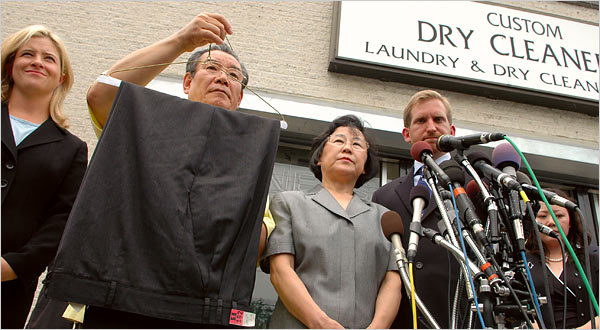| @wehaitians.com | |
No one writes to the tyrants | |
HistoryHeads/Not Just Fade Away |
| Correspond with us, including our executive editor, professor Yves A. Isidor, via electronic mail: |
| letters@wehaitians.com; by way of a telephone: 617-852-7672. |
| Want to send this page or a link to a friend? Click on mail at the top of this window. |
|
 |
|
| Posted Wednesday, June 27, 2007 |
| In Case of Missing Trousers, Aggrieved Party loses Again |
By ARIEL SABAR |
WASHINGTON, June 25 — A District of Columbia administrative law judge who filed a $54 million lawsuit against his neighborhood dry cleaner over a pair of missing pants will not get a penny, a court here ruled Monday.
 |
Stephanie Kuykendal for The New York Times |
| Jim Nam Chung and his wife, Soo Chung, outside their dry cleaning shop yesterday. Ms. Chung held the pants that led to a $54 million lawsuit by a customer. At right is Soo Choi, their daughter-inlaw and translator |
Judge Judith Bartnoff of Superior Court ruled that Judge Roy L. Pearson Jr. failed to prove that Custom Cleaners misled consumers with its “satisfaction guaranteed” sign. For that matter, Judge Pearson was not even able to convince her that they had lost his pants.
“The court finds that the plaintiff is not entitled to any relief whatsoever,” Judge Bartnoff wrote.
She ordered Judge Pearson to pay the defendants’ court costs, such as transcript and filing fees, which their lawyer said Monday could run as high as $5,000. But Judge Bartnoff has yet to rule on their motion for lawyers’ fees, which could top $100,000 and will hinge on whether she deems the lawsuit frivolous.
Judge Pearson, who represented himself, rejected a settlement offer of $12,000 in March. He asked for damages as high as $67.3 million, using a formula charging each of the store’s owners with multiple breaches of Washington’s consumer protection law. (He later lowered his claim to $54 million.) He did not answer his phone or his door or respond to an e-mail message Monday.
Though Judge Pearson is expected to appeal, the verdict brings at least momentary pause to a case that has inspired international ridicule and calls for legal reform.
Since he sued in June 2005, the case has cycled through two judges, three settlement offers, dozens of exhibits and hundreds of pages of court filings. A two-day trial that saw both plaintiff and defendant shed tears ended earlier this month.
| ___________________ | |
| A 'satisfaction guaranteed' sign does not mean unlimited compensation. | |
| ___________________ |
“We are very, very pleased with the results today,” Soo Chung, a Korean immigrant who owns Custom Cleaners with her husband and son, said Monday at a news conference outside their shop in Northeast Washington, speaking through a translator. “It’s been such a hard past two years.”
Mr. Pearson, then fresh on the job as an administrative law judge, had accused the Chungs of losing a pair of suit pants he had brought in for a $10.50 alteration job. He said that Washington’s consumer protection law, one of the nation’s most consumer friendly, entitled him to thousands of dollars for each day over nearly four years in which signs at the shop promised “same day service” and “satisfaction guaranteed.”
Mrs. Chung said she found his pants a few days after they were lost. But Judge Pearson claimed they were a cheaper gray pair she had tried to substitute for his pinstriped Hickey Freemans. In her verdict Monday, Judge Bartnoff said she found Mrs. Chung more credible than Judge Pearson.
Further, she disputed Judge Pearson’s claim that a “satisfaction guaranteed” sign entitled unhappy customers to unlimited compensation.
“A reasonable consumer would not interpret ‘satisfaction guaranteed’ to mean that a merchant is required to satisfy a customer’s unreasonable demands,” she wrote. Suevon Lee contributed reporting.
Copyright 2007 The New York Times Company. Reprinted from The New York Times, National, of Tuesday, June 26, 2007
| Wehaitians.com, the scholarly journal of democracy and human rights |
| More from wehaitians.com |